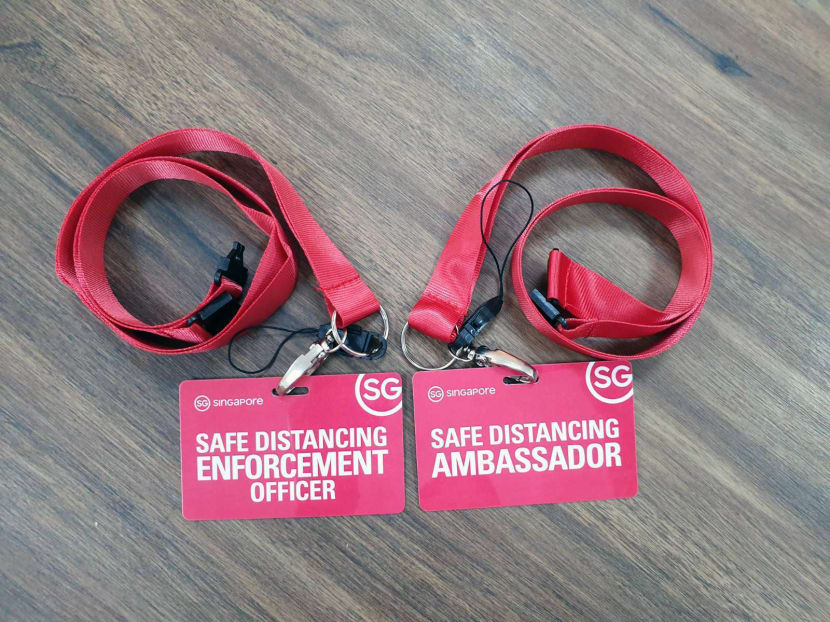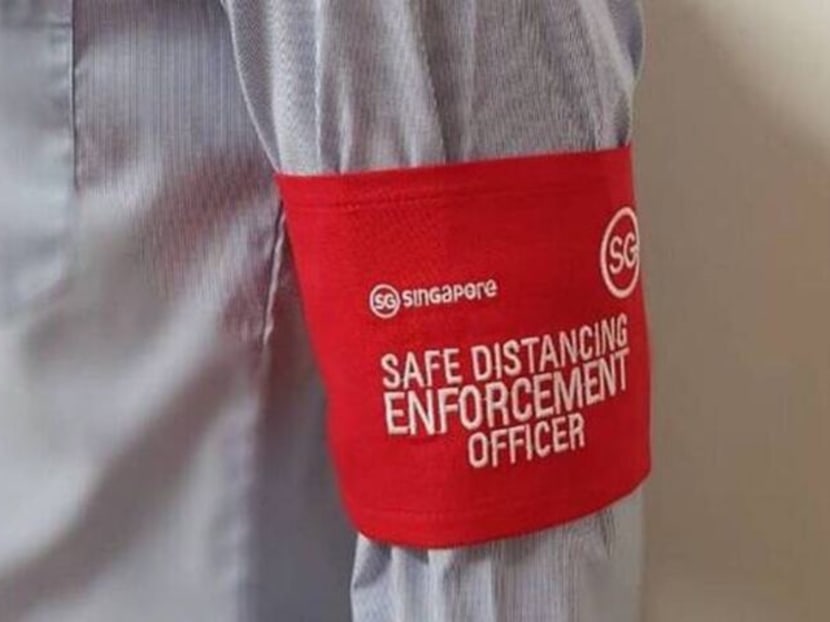Explainer: What are the legal powers of Covid-19 safe distancing enforcement officers?
SINGAPORE — The case of a man who expressed unhappiness that safe distancing enforcement officers had entered his home to search for potential Covid-19 breaches without a warrant has triggered some public concern over the legal boundaries of such officers.
- The powers of safe distancing enforcement officers are set out in the Covid-19 (Temporary Measures) Act 2020 and Infectious Diseases Act
- They can “at any time without warrant and with such force as may be necessary, stop, board, enter, inspect and search any premises or conveyance”
- Homeowners cannot deny them entry; the law states that anyone who refuses or fails to comply with their directions are liable
SINGAPORE — The case of a man who expressed unhappiness that safe distancing enforcement officers had entered his home to search for potential Covid-19 breaches without a warrant has triggered some public concern over the legal boundaries of such officers.
On Monday (Aug 2), the Urban Redevelopment Authority (URA) refuted the social media claims of Mr Nick Mikhail, stating that its officers, who were acting as safe distancing enforcement officers, are “empowered to enter, inspect and search various premises, including residences, without a warrant, to check whether Covid-19 regulations are being complied with”.
TODAY unpacks the legal provisions that allow such inspections and searches, the scenarios for when a search warrant is not needed, and whether homeowners have legal grounds to deny entry to safe distancing enforcement officers.
WHICH LAW GRANTS SUCH POWERS?
Section 35(5) of the Covid-19 (Temporary Measures) Act 2020, which was passed by Parliament in April last year, states that enforcement officers appointed by the Minister for Health, have “all the powers of a health officer” authorised under parts of the Infectious Diseases Act to ascertain if prevailing Covid-19 regulations are being complied with.
The powers, as listed under Sections 55A, 55B and 57 of the Infectious Diseases Act, include the power to:
At any time without warrant and with such force as may be necessary, stop, board, enter, inspect and search any premises or conveyance
Require any person to furnish any information within his knowledge
Demand that any person provide his or her name and address and other proof of identity
Section 35(1) of the Covid-19 Act said that the individuals who can be appointed as enforcement officers include, among others, police officers, public officers, and officers of statutory bodies.
The police said in response to queries that they have been working with various agencies to enforce safe distancing rules since April last year, when a circuit-breaker partial lockdown was imposed to contain the spread of Covid-19. Police officers take part in selected safe-distancing enforcement operations with other agencies "where there may be potential law-and-order concerns".
DIFFERENCE BETWEEN SAFE DISTANCING AMBASSADORS AND ENFORCEMENT OFFICERS
Safe distancing ambassadors, in contrast, do not have enforcement powers.
There are about 3,000 safe distancing ambassadors and enforcement officers deployed daily, coming from 17 government agencies, the Ministry of Sustainability and the Environment (MSE) and the Ministry of Home Affairs (MHA) said in a joint reply to TODAY last month.
The two roles can be distinguished by the red armband that only enforcement officers wear, with the words “safe distancing enforcement officer” printed on it.
The enforcement officers, like safe distancing ambassadors, may also be in their agencies’ corporate attire, and carry a staff pass and/or lanyard, or the SG Clean Ambassador pass.
MSE had said last year that members of the public should always request the officer’s identification to verify his or her identity before complying with the officer’s instructions, in order to be wary of those who impersonate enforcement officers.
A 19-year-old teenager was arrested last November for pretending to be one to cheat others.

WHAT ARE THE LIMITS OF THE POWERS OF SAFE DISTANCING ENFORCEMENT OFFICERS?
Speaking to TODAY, Assistant Professor of Law Benjamin Joshua Ong from the Singapore Management University (SMU) said an enforcement officer may be legally liable to pay damages to the homeowner if he does not act in “good faith and with reasonable care”.
He interpreted this from Section 35(8) of the Covid-19 Act, which states that an enforcement officer is not legally liable for anything done in this manner.
Asst Prof Ong added: “I think it is arguable that ‘good faith’ means that it would only be lawful for an enforcement officer to enter and search premises if he has, at the least, some cause for suspecting that the rules are not being complied with.
“Otherwise, the enforcement officer may be committing the tort of misfeasance in public office and/or the tort of trespass.”
Bad faith was referred to in past cases as an act of “malice”, or the “conscious doing of anything that the officers knew to be wrong or supposed to be wrong”, he said.
TODAY has asked URA to elaborate on the procedures that safe distancing enforcement officers have in place before and when entering a home to check for Covid-19 breaches.
CAN HOMEOWNERS DENY ENTRY TO THESE OFFICERS?
No. The law states that any person who refuses or fails to comply with directions from the enforcement officer “without reasonable excuse” shall be guilty of an offence.
Enforcement officers are considered public servants, and Section 186 of the Penal Code makes it an offence to obstruct a public servant in the discharge of his public functions.
If convicted of the offence, a person may be jailed for up to three months, fined up to S$2,500 or both.
Confirming this, SMU’s Associate Professor of Law Eugene Tan told TODAY: “At the point of intended search or inspection, the legal occupiers are probably not able to deny enforcement officers entry to the premises.”
Criminal lawyer Gino Hardial Singh of Abbots Chambers added that “reasonable excuse” is not defined and it is a question of fact that the court would have to rule on should such a matter be litigated.
Templars Law director Genesis Shen said that the homeowners’ biggest concern may be the verification of the identity of the enforcement officer.
“It does not appear that the enforcement officers are identifiable by photo ID, and the red tag and red T-shirt seem quite easy to replicate,” he said.
WHEN IS A SEARCH WARRANT NEEDED?
Under the Criminal Procedure Code, the court can be called upon to issue a search warrant for the purposes of an inquiry into an alleged criminal offence under certain circumstances, such as when a police officer had tried but failed to get the document or thing that was summoned.
The same code already grants the police broad powers to enter and search premises without a warrant in the course of investigating arrestable offences. These include housebreaking, theft, and sexual offences such as rape and outrage of modesty.
Mr Shen said: “In summary, an individual’s existing right, even before the Covid pandemic, to resist the entering and searching of your home without a warrant is very limited.”
WHAT LEGAL RECOURSE DO HOMEOWNERS HAVE TO DISPUTE THE HANDLING OF THEIR SEARCH?
Assoc Prof Tan said a simple non-legal recourse would be to file a complaint with the government agency that was responsible for the search.
Alternatively, one could seek judicial review in administrative law, alleging that the authorities acted either unlawfully, unreasonably, or in a procedurally flawed manner, he said.
Possible defences could be that there was no formal complaint of the control order being breached, or the authorities were on a “fishing expedition”, he said, adding: “The burden of proof will be on the complainant to show that the authorities conducted themselves as such.”









